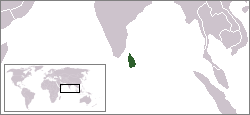Massacre
The Chunnakam market, one of the busiest in the island's north is situated 7 km from Jaffna town on the Kankesanturai road. This is a central market, where agricultural produce grown in the districts of Jaffna, Kilinochchi etc. would be brought for sale.
On 28 March 1984, personnel belonging to the Sri Lankan military arrived at the market and the town's bus stop in tanks and jeeps and opened fire at the crowd in both these places. Eight civilians were shot dead, and over 50 were injured. The military then proceeded to set fire to the market and burnt down all of the shops contained within it. [1]
The military then left the location, and drove through Mallakam and Tellipalai along the Kankesanturai road. Here, they started shooting at everyone, who came within their sight. At least one civilian was killed, and female students in Tellipalai, who were returning home from school after completing their examinations were assaulted. Consequently, 26 students were injured. And another than 20 civilians belonging to these two villages were also injured. [1]
This page is based on this
Wikipedia article Text is available under the
CC BY-SA 4.0 license; additional terms may apply.
Images, videos and audio are available under their respective licenses.
